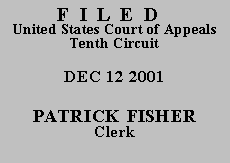

| UNITED STATES OF AMERICA,
v.
LANNY OLIVER |
No. 01-1108
(D.C. No. 00-CR-336-M) (D. Colo.) |
We agree with the district court's reasoning. Nothing in the record suggests that Oliver's pre-Miranda statements were coerced. See Oregon v. Elstad, 470 U.S. 298, 310 (1985) ("The failure of police to administer Miranda warnings does not mean that the statements received have actually been coerced, but only that courts will presume the privilege against compulsory self-incrimination has not been intelligently exercised."). Where the statement is not coerced, "a careful and thorough administration of Miranda warnings serves to cure the condition that rendered the unwarned statement inadmissible." Id. at 310-11.
Oliver has not identified any basis for concluding that these principles do not govern here. In the course of a valid traffic stop, the police discovered that there was an outstanding warrant for the driver, and promptly arrested him. In conducting a search of the vehicle incident to the arrest, officers found a firearm under the passenger seat in which Oliver was riding; the firearm was not accessible to the driver. When officers asked Oliver what he had been arrested for in the past, Oliver replied "everything." There can be no reasonable dispute that the police were justified in placing Oliver under arrest.
Even if Oliver was prematurely detained between the time when the police asked him to step out of the car and the time when the police located the firearm, that brief period of detention was of little consequence. Whether or not Oliver was free to leave during the search of the car is irrelevant to the establishment of probable cause for Oliver's arrest, as both elements of the crime the firearm under Oliver's seat, and Oliver's felony record were ascertainable regardless of whether Oliver was physically present when the vehicle was being searched. Further, no questioning of Oliver occurred until after he was lawfully arrested.
Even assuming that Oliver's arrest was improper, the causal link between the arrest and his post-Miranda statement is insufficient to justify the statement's suppression. The Supreme Court has looked to three factors in determining whether an unlawful arrest has tainted a subsequent confession: (1) the temporal proximity of the arrest to the confession; (2) the presence of intervening circumstances; and (3) the flagrancy of the official misconduct. Brown v. Illinois, 422 U.S. 590, 603-04 (1975). All three factors favor admission in this case. First, eleven hours passed between Oliver's arrest and his statement, during which time he was apparently left alone by officers. Second, significant intervening events occurred between the period of his unlawful detention and his post-Miranda statement namely, the discovery of the firearm and the establishment of probable cause. Third, the officers' conduct was by no means flagrant. At most, the arresting officers prematurely detained Oliver by a few minutes. As discussed above, that premature detention did not materially aid the officers, as probable cause could have been established regardless of whether Oliver was present at the scene. Under these circumstances, the potential illegality of Oliver's arrest does not warrant suppression of his post-Miranda statement. See United States v. Manuel, 706 F.2d 908, 912 (9th Cir. 1983) (upholding admissibility of defendant's confession where it "was not obtained by an exploitation of the possible illegality of his arrest").
At its core, Oliver's argument is based on the officers' failure to Mirandize him prior to initiating questioning. The failure to administer the Miranda warnings to Oliver on the night of the arrest does not invalidate the statement made by Oliver after he was Mirandized. As the Supreme Court has recognized, "[i]t is an unwarranted extension of Miranda to hold that a simple failure to administer the warnings, unaccompanied by any actual coercion or other circumstances calculated to undermine the suspect's ability to exercise his free will, so taints the investigatory process that a subsequent voluntary and informed waiver is ineffective for some indeterminate period." Elstad, 470 U.S. at 309. Under such circumstances, "the admissibility of any subsequent statement should turn . . . solely on whether it is knowingly and voluntarily made." Id. There is no allegation suggesting that the police coerced Oliver when questioning him on the night of the arrest, and the record gives no reason to question the district court's conclusion that Oliver's post-Miranda statements were both knowing and voluntary.
Oliver also raises an ineffective assistance of counsel claim, but requests that we defer ruling on the claim, as he intends simply to preserve the claim for a proceeding under 28 U.S.C. § 2255. We thus need not address it.
The district court's judgment is therefore AFFIRMED.
ENTERED FOR THE COURT
David M. Ebel
Circuit Judge
*.After examining the briefs and appellate record, this panel has determined unanimously to grant the parties' request for a decision on the briefs without oral argument. See Fed. R. App. P. 34(f) and 10th Cir. R. 34.1(G). The case is therefore ordered submitted without oral argument. This Order and Judgment is not binding precedent, except under the doctrines of law of the case, res judicata, and collateral estoppel. The court generally disfavors the citation of orders and judgments; nevertheless, an order and judgment may be cited under the terms and conditions of 10th Cir. R. 36.3.